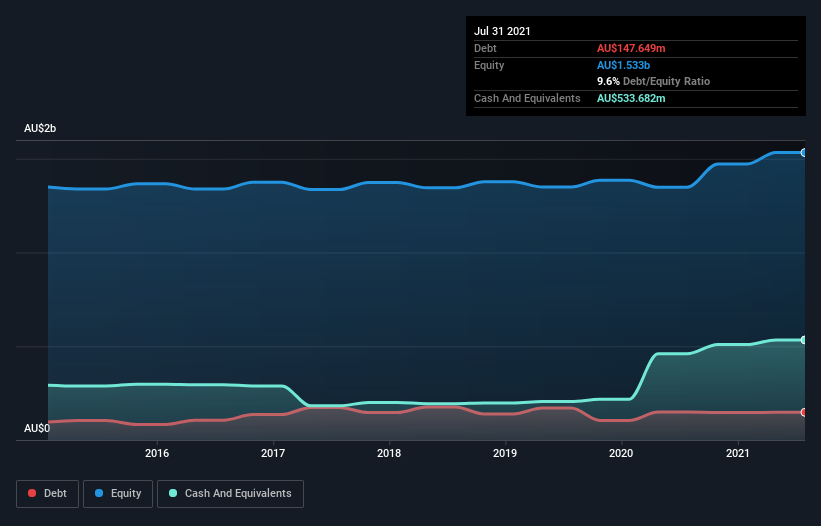These 4 Measures Indicate That Premier Investments (ASX:PMV) Is Using Debt Safely
Legendary fund manager Li Lu (who Charlie Munger backed) once said, 'The biggest investment risk is not the volatility of prices, but whether you will suffer a permanent loss of capital.' It's only natural to consider a company's balance sheet when you examine how risky it is, since debt is often involved when a business collapses. We note that Premier Investments Limited (ASX:PMV) does have debt on its balance sheet. But is this debt a concern to shareholders?
What Risk Does Debt Bring?
Generally speaking, debt only becomes a real problem when a company can't easily pay it off, either by raising capital or with its own cash flow. If things get really bad, the lenders can take control of the business. However, a more frequent (but still costly) occurrence is where a company must issue shares at bargain-basement prices, permanently diluting shareholders, just to shore up its balance sheet. By replacing dilution, though, debt can be an extremely good tool for businesses that need capital to invest in growth at high rates of return. When we examine debt levels, we first consider both cash and debt levels, together.
Check out our latest analysis for Premier Investments
How Much Debt Does Premier Investments Carry?
The chart below, which you can click on for greater detail, shows that Premier Investments had AU$147.6m in debt in July 2021; about the same as the year before. However, its balance sheet shows it holds AU$533.7m in cash, so it actually has AU$386.0m net cash.
How Strong Is Premier Investments' Balance Sheet?
The latest balance sheet data shows that Premier Investments had liabilities of AU$512.1m due within a year, and liabilities of AU$236.2m falling due after that. Offsetting these obligations, it had cash of AU$533.7m as well as receivables valued at AU$9.49m due within 12 months. So its liabilities total AU$205.1m more than the combination of its cash and short-term receivables.
Of course, Premier Investments has a market capitalization of AU$4.86b, so these liabilities are probably manageable. But there are sufficient liabilities that we would certainly recommend shareholders continue to monitor the balance sheet, going forward. Despite its noteworthy liabilities, Premier Investments boasts net cash, so it's fair to say it does not have a heavy debt load!
On top of that, Premier Investments grew its EBIT by 66% over the last twelve months, and that growth will make it easier to handle its debt. When analysing debt levels, the balance sheet is the obvious place to start. But it is future earnings, more than anything, that will determine Premier Investments's ability to maintain a healthy balance sheet going forward. So if you want to see what the professionals think, you might find this free report on analyst profit forecasts to be interesting.
Finally, a company can only pay off debt with cold hard cash, not accounting profits. Premier Investments may have net cash on the balance sheet, but it is still interesting to look at how well the business converts its earnings before interest and tax (EBIT) to free cash flow, because that will influence both its need for, and its capacity to manage debt. Happily for any shareholders, Premier Investments actually produced more free cash flow than EBIT over the last three years. That sort of strong cash generation warms our hearts like a puppy in a bumblebee suit.
Summing up
We could understand if investors are concerned about Premier Investments's liabilities, but we can be reassured by the fact it has has net cash of AU$386.0m. And it impressed us with free cash flow of AU$380m, being 131% of its EBIT. So we don't think Premier Investments's use of debt is risky. The balance sheet is clearly the area to focus on when you are analysing debt. But ultimately, every company can contain risks that exist outside of the balance sheet. For instance, we've identified 1 warning sign for Premier Investments that you should be aware of.
If, after all that, you're more interested in a fast growing company with a rock-solid balance sheet, then check out our list of net cash growth stocks without delay.
This article by Simply Wall St is general in nature. We provide commentary based on historical data and analyst forecasts only using an unbiased methodology and our articles are not intended to be financial advice. It does not constitute a recommendation to buy or sell any stock, and does not take account of your objectives, or your financial situation. We aim to bring you long-term focused analysis driven by fundamental data. Note that our analysis may not factor in the latest price-sensitive company announcements or qualitative material. Simply Wall St has no position in any stocks mentioned.
Have feedback on this article? Concerned about the content? Get in touch with us directly. Alternatively, email editorial-team (at) simplywallst.com.

 Yahoo Finance
Yahoo Finance 
